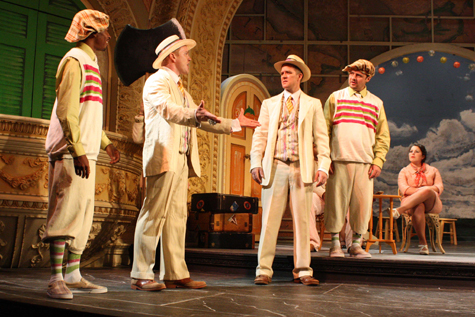
PAIRS OF PAIRS Four alike in the Bard’s Comedy.
|
Even if you've never seen Shakespeare's Comedy of Errors, the first five minutes and a quick scan of the dramatis personae are enough to reveal the gist of the plot arc: Two sets of twin boys, one set born to a merchant and his wife and the other bought as slaves, are separated in a shipwreck, are raised in different towns with identical names — both well-born boys answer to Antipholus, both slaves to Dromio — and are hilariously be-farced when one set shows up years later on the other's turf. There ensue mistaken identities, livid wives, arrests, accusations of demonic possession, and lots and lots of beatings, followed by familial reunions, restoration of fortunes, and a betrothal. These sorts of plot points are hit pretty often in Shakespeare's comedies, and it's not hard to start feeling that you've seen it all before. As someone who watches a lot of these, I'm delighted to report that the Theater at Monmouth's production of Comedy is nothing but fresh, non-stop, stand-out fun, from shipwreck to filial embraces.
There are three good reasons: First of all, director Curt. L. Tofteland updates the Mediterranean island setting of Ephesus to the 1950s, which means linen suits, Django playing in interludes, and a near-constant circulation of brightly colored cocktails with little umbrellas. Second of all, the show's countless slapstick wallops, yanks, and pinches are given glorious cartoon impact by an on-stage, cocktail-sipping Foley artist (Brian Bell, wittily). And third of all, Tofteland's cast is A+ in both tenor and tempo — there is quite literally never a dull moment in this show.
When the Antipholus and Dromio visiting from Syracuse (Torsten Hillhouse and Mike Anthony) arrive on Ephesus, they almost immediately start befuddling things for the local Antipholus and Dromio (Dustin Tucker and J.H. Smith III). Their initial reactions to the situational ironies are marvelously entertaining: Anthony's little-boyish Dromio, upon first returning to the wrong Antipholus with a pinwheel and a toy sheep, tries to stave off the confusion by smiling as long as he can, and the subtleties of his slow-melting smile are priceless. The comedy of Smith's Dromio is kinetic, with quick physical humor and quite an array of responses to being whacked by both Antipholi, wife Adriana (Annie Rubino), and her sister Luciana (Elizabeth Helitzer), for whom the visiting Antipholus rather inconveniently falls. Tucker's tetchy, schmuck-ish Antipholus is a great contrast to Hillhouse's straighter-man Antipholus, and is particularly funny as his annoyance builds to holy, explosive rage.
Comedy is thought to be one of Shakespeare's earlier works, and its vim and snappy pace do seem like the stuff of a young virtuoso. The wordplay is spiked and frothy all through this play, and Tofteland's actors clearly relish it. In one particularly magical spiel, the Syracusean Dromio compares the substantial body of "his" serving-wench wife to a globe: "Yep, she's spherical," he says, with a sort of resigned dismay, then goes on to map out her various "countries." (What of the Netherlands? asks Antipholus. Nauseated at the mere suggestion, Dromio replies that he "did not look so low." Snap!)